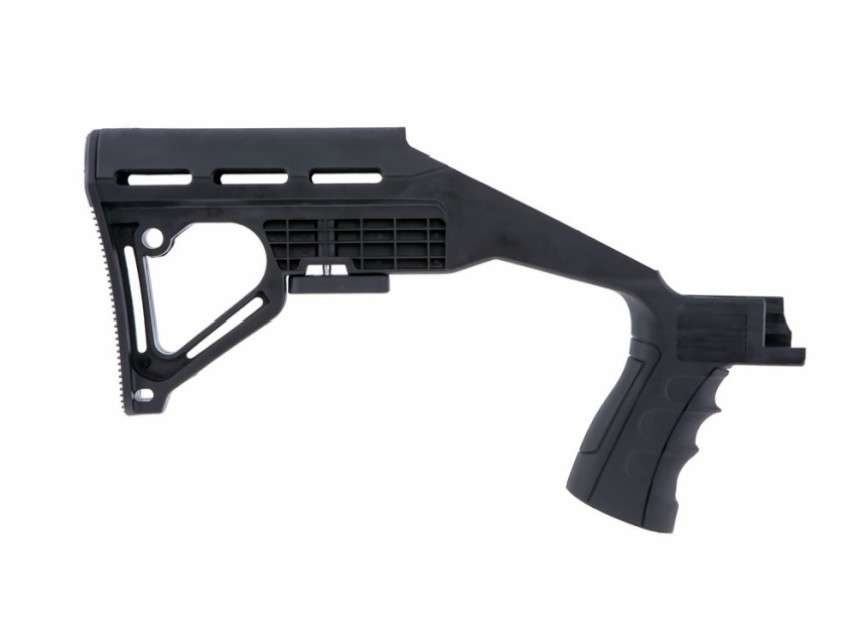Did Bump Stocks Make the Las Vegas Shooting Deadlier?
The accessories, which are legal and widely available, sacrifice accuracy for speed.

Hillary Clinton was widely ridiculed for claiming that Sunday's mass shooting in Las Vegas demonstrated the folly of an NRA-backed bill that would loosen federal restrictions on suppressors, a.k.a. silencers. Clinton argued on Twitter that the death toll in Las Vegas could have been even higher "if the shooter had a silencer," since "the crowd fled at the sound of gunshots."
As firearms experts immediately pointed out, so-called silencers do not actually eliminate the sound of gunfire; they merely reduce the noise level. Even with a suppressor, the hundreds of shots fired from the 32nd floor of the Mandalay Resort and Casino would have been clearly audible.
Counterfactual speculation about the Las Vegas attack has now moved on from an accessory that Stephen Paddock did not use to one that he apparently did. The Associated Press reports that police found two bump stocks in Paddock's hotel room, which could explain why witnesses and people who listened to audio recordings of the attack thought he used a machine gun. [Update: The New York Times reports that 12 of Paddock's rifles were equipped with bump stocks.]
A bump stock is a sliding stock that speeds up a rifle's rate of fire by harnessing recoil energy to reset the trigger. Instead of squeezing the trigger, the shooter holds his trigger finger steady while pushing the barrel forward with his other hand, thereby firing a round. The recoil repositions the trigger, and continuing to exert forward pressure on the barrel makes the rifle fire repeatedly. The gun still fires just once per trigger pull, so it is still a semiautomatic (and therefore legal), but it fires faster than it would if the shooter had to bend his trigger finger each time.
Assuming that Paddock used the bump stocks police found, did they make the number of deaths higher than it otherwise would have been? Not necessarily, since bump stocks sacrifice accuracy for speed; the jostling required by the technique makes the rifle harder to aim, especially at long distances. According to the Wikipedia entry on bump stocks, they "greatly degrade the accuracy of the firearm, due to the necessary jerking of the weapon, which makes viable aiming impossible," and "the inaccuracy renders the practice uncommon."
Although bump stocks are legal, have been around for years, and are readily available, I don't recall any other mass shootings in which they were used. Yet previous mass shooters have managed to kill dozens of people, sometimes with ordinary handguns. While the death toll in Las Vegas (58) was higher than in any other modern mass shooting, Paddock's main advantage seems to have been firing from a height, which made it difficult for his victims to find cover.
Sen. Dianne Feinstein (D-Calif.), not surprisingly, wants to ban bump stocks. But Kristen Rand, legislative director at the Violence Policy Center, does not seem to think they pose much of a threat. USA Today paraphrased Rand as saying "there's a lot of questions about how effective they really are." She added that "it's just a gimmick to make your YouTube video and show people how fast you're shooting your gun."
Addendum: Several readers have pointed out that accuracy is less important when a shooter is firing on a dense crowd, as in Las Vegas. In that situation, even a shooter firing blindly is apt to hit someone. But that does not mean the injury will be fatal. Paddock might have killed a similar number of people if he had fired more slowly and carefully. Notably, the ratio of nonfatal to fatal injuries in Las Vegas was about 9 to 1, which is unusually high for a mass shooting, even taking into account that some of those injuries were not caused by gunfire. (Most were.) By contrast, the ratio of nonfatal to fatal injuries was less than 2 to 1 in the next four deadliest mass shootings.


Show Comments (102)